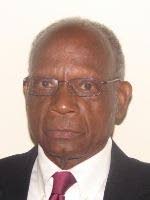Padmore: Williams was a disappointed man

The late prime minister Dr Eric Williams did his best for the country but overall ended his days a disappointed man, surmised former cabinet minister Overand Padmore, speaking with Newsday about a dossier of files recently declassified by the Federal Bureau of Investigations (FBI.)
Padmore hailed Williams as an historian and scholar who had an outlook based on the perspective of the Caribbean and of the underdog.
“He sought to advance the national interest of the Caribbean. When that faltered in terms of the Federation, he narrowed his outlook to Trinidad and Tobago within an embracing Caribbean society.” Padmore said this fact seemed not to be recognised in the FBI dossiers that criticised Williams as anti-white and anti-US.
“Any diplomatic analysis of Dr Williams that does not see it in that light is not understanding Dr Williams.” Rather than Williams being anti-white, Padmore said, the fact was ex-colonies were facing imperialist countries seeking to repress them.
Asked if TT had been lucky to get Williams as a leader, Padmore replied, “Trinidad and Tobago is perhaps one of the hardest countries to govern. In the absence of a Dr Williams, we would never have achieved independence when we did.” However, Padmore said when Williams left Parliament for the last time, public servants were outside the Red House demonstrating over salaries, after which he became more and more reclusive.
“He started leading an independence movement and trying to uplift the people in 1956, but people were stubborn. While they wanted those things, the efforts they had to make to achieve them they were reluctant to make, and blamed him for their failure.
“He would have been a disappointed man, because he would have thought Trinidad and Tobago would have been much further advanced at that time in the 1980s. Everybody talked of this hardworking man, but the people did not emulate that aspect of him.”
Padmore added, “In the final analysis, I have to want the change. You might be the leader to inspire me, but I have to act on the inspiration you provide, or my condition won’t change. I can’t bask in your brilliance and think that will make me successful.”
Asked his recollections of Williams’ persona, Padmore said he was a magnetic person. “You look at pictures of the man, he looked the part of the leader.
“He was not a tall, powerful man, but short. But there was a style and a persona that he carried and he would stand out wherever you saw him. In pictures of other world leaders, you see clearly the man had the personality of a leader. The man had personality.”
Asked what drove Williams in his endeavours, Padmore replied, “He was a scholar that had a view of the world and the imbalances in the world. He was from an underdog part of the world that ought not to be an underdog.
“He had a self-confidence. He was brilliant and knew it, and had the self-confidence to go with it.”
Padmore said that at the Caribbean Commission, Williams was never intimidated by US or UK officials, but on any point of dispute would tell them, “‘Let’s go to the library.’
So he was always seen to be a crusty person because he did not subject himself to alien authority.”
Asked what drove Williams, Padmore cited Williams’s work, My Relations with the Caribbean Commission, whose opening and closing paragraphs he had read aloud in a speech to an audience of thousands at Woodford Square. “He opened that speech and closed it with very emotional language that struck a bond between himself and the people that sustained him throughout his entire career:
“‘I stand before you tonight as a people and the British West Indies as the representative of a principle, a cause and a defeat. The principle is the principle of intellectual freedom, the cause is the cause of the West Indian people and the defeat is the defeat of not appointing local people to high office.’
“I was in the square that night and you could literally have heard a pin fall.”


Comments
"Padmore: Williams was a disappointed man"